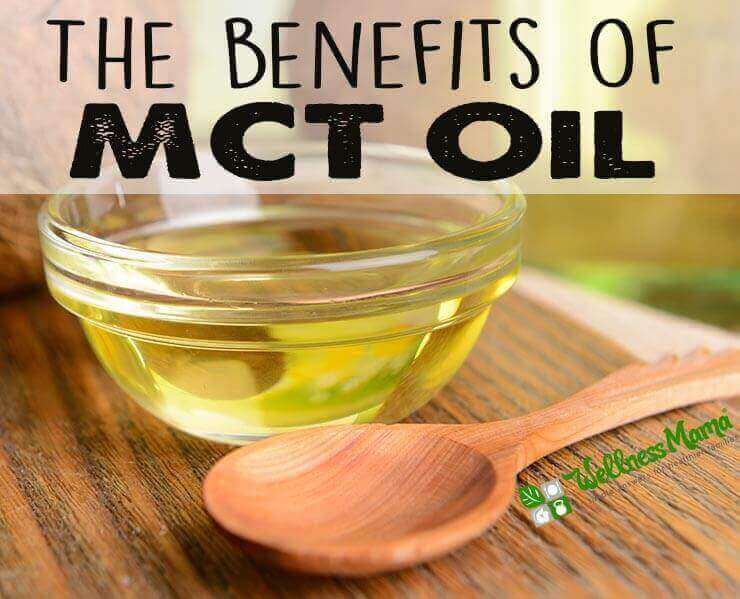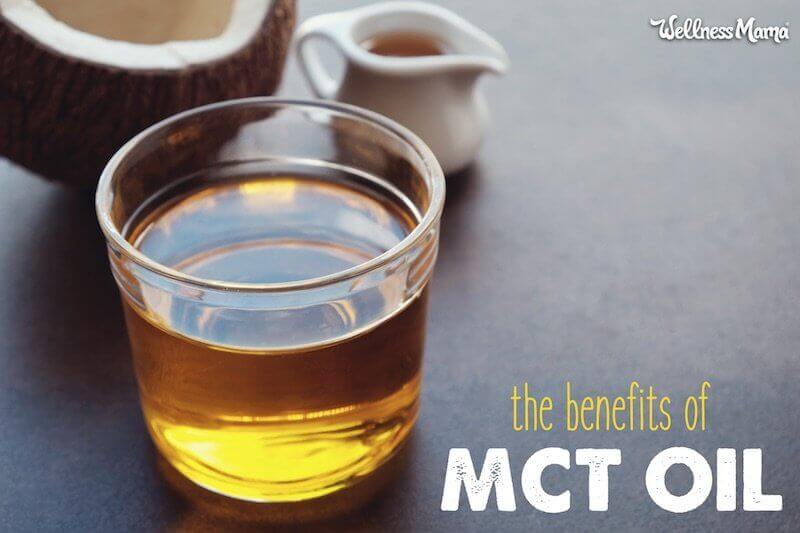It is no secret that coconut oil is a great source of healthy fats with hundreds of uses in cooking and beauty products. But did you know that MCT oil is a similar but more concentrated oil with many of the same benefits?
What is MCT Oil?
MCTs or Medium Chain Triglycerides (of Medium Chain Fatty Acids) are fatty acids of a certain length, as the name suggests. MCT oil is an oil made up of one or more of these medium chain triglycerides and it is translucent and tasteless liquid at room temperature.
Medium Chain Fatty Acids vs. Long or Short Chain
All fats are composed of carbon and hydrogen, but they vary in length. By definition, “Short Chain” fatty acids have 5 or fewer carbons, medium chains have 6-12 and long chain fatty acids have more than 12.
Medium Chain Triglycerides are considered easily digestible and beneficial fats, and instead of being metabolized through digestion like most other foods, these fats are processed in the liver. MCTs provide fast and lasting energy and are easily absorbed by the body.
These fatty acids are all classified as Medium Chain Fatty Acids (MCFAs):
- Caproic acid, also called hexaonic acid (C6-six carbons)
- Caprylic Acid, also called Octanoic acid (C8-8 carbons)
- Capric Acid, also called Dacanoic acid (C10-10 carbons)
- Lauric Acid, also called Dodecanoic acid (C12- 12 carbons)
MCT oil can be a mixture of one or more of these types of MCFAs and is typically extracted from coconut or palm oil, which are both rich natural sources. MCFAs are also found in human breastmilk, goats milk, cheese, butter, and other types of dairy.
Whether consumed in whole form from coconut or palm oil or in a concentrated MCT form, these triglycerides have several benefits.
MCT Oil Benefits
The unique structure of medium-chain fatty acids make them beneficial in several ways:
Easier to Digest
MCTs don’t need bile salts to be digested and can pass directly from the digestive system to the blood stream without being modified by digestion like long chain fats. This makes them easier to digest and utilize than long chain fatty acids.
Because they are so easy to absorb and use, MCTs are often a good choice for those who struggle with digestive problems, fat absorption or lack a gallbladder.
Good Source of Energy
Since MCTs are processed in the liver, they are absorbed quickly and provide fast and sustained energy. MCTs move passively via the hepatic portal system to the liver without the need for a longer digestive process. Unlike almost all other foods, MCTs do not require energy to be absorbed, stored or used in the body, making them an almost perfect source of natural energy.
Support Hormones
Since fats are needed for proper hormone creation and balance in the body, MCTs may offer special benefits for those struggling with hormone imbalance. There is also research suggesting that medium chain fats may be beneficial for maintaining a healthy weight by helping balance hormones and improving insulin sensitivity.
Gut Health
MCTs have antiviral and antibacterial properties and there is some evidence that they may help balance gut bacteria and combat pathogenic bacteria. They also offer the digestive system a break because they are so easily utilized by the body. When used with a healthy diet and other ways to support gut bacteria, MCTs may help improve gut health over time. (Though regular coconut oil may be more effective for this, see below).
Immune Health
The same antiviral and antibacterial properties make MCTs beneficial for immune as well. Healthy fats are important for proper immune function, and since MCTs can be more easily used by the body, this may be especially beneficial for those who have trouble absorbing fats and who struggle with immune function.
MCT Oil vs Coconut Oil
This is where things get really interesting. MCT oil is extracted from Coconut oil and Palm oil, which are considered great natural sources of Medium Chain Triglycerides.
With the emerging popularity of MCT oil, many coconut oil manufacturers boast that coconut oil is naturally high in MCTs (which it is), but there are some important caveats! MCT oil manufacturers like to brag that their products are “more concentrated” than coconut oil (which is also true), but it also doesn’t contain one beneficial form of MCT.
Here’s the deal…
It depends on the particular type of MCT that you are trying to consume. Coconut oil is high in certain types of medium chain fatty acids, while concentrated MCT oil is a better source of others.
Perhaps you’ve read that coconut oil is 62% MCT oil. It is, but not necessarily in the same form you’d find in MCT oil. That 62% is made up of a combination of the 4 types of MCFAs listed above. All of these forms are beneficial, but when a person buys an “MCT oil,” he or she is typically trying to consume Capric acid (C10) and Caprylic Acid (C8).
The MCFA composition of coconut oil is largely from lauric acid (C12), which some biochemists argue is not a true medium chain fatty acid since it acts different in the body. It is also tremendously beneficial, but for different reasons.
Lauric Acid: The Real Story
Lauric acid is the reason that coconut oil companies claim that coconut oil is better than MCT oil. It is also the reason that MCT oil companies claim that MCT oil is better than coconut. And they are both right, but for different reasons.
Oils marketed as “MCT oil” contain either a combination of Capric and Caprylic acid, or just concentrated Caprylic acid, making them a faster and more usable source of energy. They often don’t contain Lauric Acid (C12), which acts like a combination long chain and medium chain fatty acid in the body, making it slower to digest.
The dominant fatty acid in coconut oil, on the other hand, is lauric acid, which comprises 50% of the total fat content. Coconut oil also contains a very nominal amount of Caproic Acid (C6), about 6% Caprylic Acid (C8) and about 9% Capric Acid (C10).
So coconut oil is a great source of MCFAs, but the amounts depend on if you consider Lauric Acid (C12) a medium chain triglyceride or a long one. Ask a chemist and you may be told it is a medium-chain fatty acid. Ask a biochemist and you may be told it is a long-chain fatty acid. Either way, it is beneficial.
Lauric acid is naturally antimicrobial, antibacterial and antiviral. It is excellent for the skin and it has even been studied for its potential ability to help with severe acne for this reason! Coconut oil is the richest natural source, followed by human breastmilk, which contains up to 20% of its saturated fat content as lauric acid. (Side note to nursing moms: there are studies that show that consuming coconut oil helps improve the lauric acid content of milk.)
During digestion, lauric acid is converted monolaurin, a vital substance for optimal immune function. MCT oil doesn’t contain lauric acid. While the Caprylic and Capric acids in MCT oil have some antiviral and antibacterial properties of their own, they don’t contain lauric acid and won’t help the body create monolaurin.
Long story short:
- For fast and lasting energy, concentrated MCT oil is more beneficial
- For Lauric acid and its immune benefits, coconut oil is the superstar
Coconut oil and MCT oil are both beneficial in their own ways and I use them both in different ways. Coconut oil is typically cheaper and supports the immune system, while MCT oil is tasteless and provides faster energy.
Cautions About MCT Oil
There are some concerns with using MCTs, both environmental and digestive.
Environmental Cautions
Concentrated MCT oils are often derived from “a blend of coconut and palm oils.” I personally always look for MCT oils sourced only from coconut oil or sustainable and rainforest friendly palm oil because the palm oil industry is responsible for the deforestation for large parts of the rainforest. Thousands of acres of rainforest are being destroyed to make room for palm production. This has also driven many animals out of their natural habitats and greatly threatens species like the orangutan and Sumatran tiger, which are both in danger of extinction.
The large-scale production of palm crops in these areas has also driven native people from their homes and destroyed their sources of income (as many of them rely on the rainforest for food or their livelihoods.
Digestive Cautions
On a less serious (but still important) note, it is important to start using MCT oil slowly. Because it is so readily and quickly used by the body, it can lead to all kinds of (temporary but embarrassing) digestive disturbances if you jump in to quickly. I’ve even stumbled across entire threads in online forums bemoaning the “disaster pants” that resulted from using too much MCT oil too quickly. It is generally considered safe to start with 1/2 to 1 teaspoon and work up as the stomach permits.
What Kind of MCT Oil?
When buying MCT oil, I look for one that is sourced from only organic coconut (no palm). Most brands do contain palm oil, but I’ve been using this brand and really like it.
How to Use MCT Oil
Unlike coconut oil, MCT oil is liquid at room temperature and is tasteless. It is better for rapid energy and metabolism than coconut oil and it may also be a great choice for those who don’t like the taste of coconut oil or who need a liquid oil at room temperature. It is a great neutral oil for use in homemade mayonnaise or as an unflavored oil in homemade salad dressings.
It has documented benefits for the skin when used topically and for metabolism when used internally. It can also be used to make personal care products like homemade whitening toothpaste or in lotions, salves and haircare.
Of course, the most famous use for MCT oil is Dave Asprey’s Bulletproof® Coffee recipe. This fat-packed coffee uses a mixture of grass-fed butter and MCT oil for a brain and energy boost. I accomplish similar results by adding coconut oil to my healthy coffee recipe, but have tried the MCT version and can vouch for its energy-boosting and brain-focus inducing properties. (Note: There are two Bulletproof® brand MCT oils: XCT Oil (C8+C10)and Brain Octane oil (Pure C8), which do contain palm but are sustainably sourced and use a super-clean steam distillation process of extraction).
Do you take MCT oil? What benefits have you noticed from it? Share below!



Leave a Reply